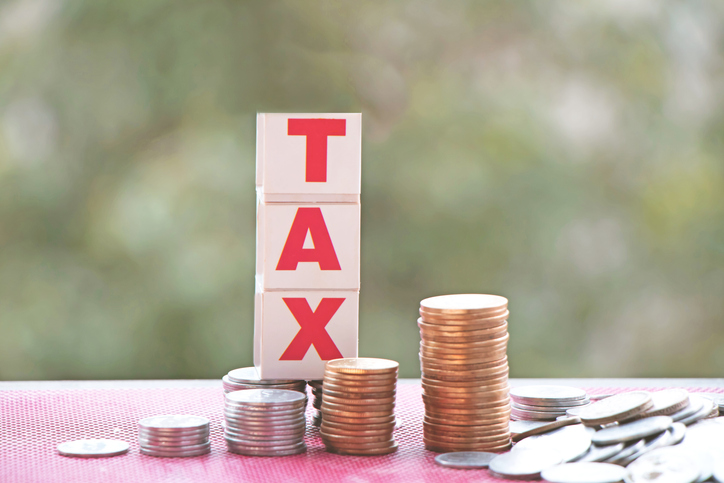
Impact and Incidence of Tax Evasion
How poor tax morale and tax evasion impacted Government's spending ability during the pandemic
Context
The COVID-19 pandemic adversely impacted the lives, livelihoods and finances of Indians. The Indian Government didn’t escape the pandemic unscathed. Central and State Finances took a hit during the pandemic induced lockdown. On one hand, Financial Year 2020-21 saw a dip in tax and not tax revenue of Central and State Governments. For instance, while the Central Government’s revenue increased approximately by 8% every year, in 2020-21, it declined by 2.9%. On the other outlay during the same period had to be amped up to assuage the effects of the pandemic on citizens. Apart from the higher allocation for health during the years following the pandemic, the Indian Government spent close to INR 7,48,919.63 Lakh Crores towards relief packages, inoculation, research, establishment of makeshift hospitals. State Governments also announced packages for persons affected by the pandemic.
Interestingly, the Central Government met most of this amped up expenditure from the PM-CARES Fund and the State Government through increased market borrowings. This indicates that the Government’s revenue generating methods are either inadequate or inefficient, the latter being more likely. Tax evasion is rampant in India. Every other day, instances of tax raids and large amounts of undisclosed income being detected are reported in the country. India’s history of tax evasion is long but can be attributed to poor tax morale.
Research Objective
In this study, we wanted to understand the extent of tax evasion in the country, the government’s measures to tackle evasion, the impact of amnesty schemes that are believed to bad tax policy. However, most importantly, we wanted to understand what motivates people to pay taxes or not pay taxes. To understand taxpayer behaviour, we surveyed 517 persons in Mumbai and Thane in July 2022.
We sought to gain a better understanding the following aspects of taxpayers’ morale:
- Quid pro quo for tax payment
- Appropriateness of tax rates
- The complexity of tax laws
- Adequacy of enforcement measures
Findings
Quid pro quo for tax payment
As the virus spread, people who could afford private hospitals rushed to private hospitals and the ones that couldn’t, rushed to government hospitals. Nearly 90% of the participants mentioned that their income was negatively affected during the pandemic. 46% of the participants claimed that either they or their family members were hospitalised for COVID-19 out of which 70% said that they availed healthcare services from government funded hospitals.
50% of the participants mentioned that they were eligible for some relief measures announced by the government. Out of these people, nearly 77% were eligible for relief measures funded by the Central Government and the rest were eligible for some relief measures announced by their State Governments. Only 30% of the participants received some aid from the Government which was either in the form of free ration, deposits into their Jan Dhan Account, or some money under COVID-19 relief schemes. This coupled with the fact that 91% of the participants did not report any concession in taxes during the lockdown is concerning.
Less than half of the participants believe that tax money has been put to good use in India. While 64% of the participants believed taxes have a functional value i.e., they are paid to serve a purpose such as better infrastructure, improving services to the populace, fostering development, etc., 36% felt that taxes were a mere obligation. It is argued that people that do not trust governments may think that tax evasion is justified.
It appears that 60% of the participants spent up to 25% of their annual income on healthcare during the pandemic and 90% of the participants continued to pay the same level of taxes. However, only 30% of all participants received any aid from the government during the pandemic. Payment of taxes may be adversely affected if citizens do not perceive any benefit from payment of taxes.
Appropriateness of tax rates
32% of the participants said that everyone should pay taxes. The balance 68% believed some criteria like level of income, type of job, type of revenue generating activity such as business, etc., must be used to determine who should pay taxes. Interestingly, there was no correlation between the level of income of a participant and the belief that everyone should pay taxes i.e., in every income group, the proportion of people who believed that everyone should pay taxes and otherwise was similar.
Where participants suggested a certain criterion for who should pay taxes, 60% of them claimed that they did not fall in the said category.
Complexity of tax laws and adequacy of enforcement measures
Only 57% of the participants file their Income-tax returns. Out of the participants that file returns, 47% engage the services of a Chartered Accountant for the same. 70% of the participants have never visited or used the income tax filing website. Less than 1% of the participants experienced some issue with getting refunds or incorrect demands raised on them. Around 4% of the survey participants had acquaintances that had been penalised for some offence under the Income-tax Act, 1961 or the GST law.
Our Recommendations
Tax departments employ several measures to keep tax evasion in check. However, what influences a person to pay or not pay taxes isn’t considered while designing interventions by tax departments. Behavioural science offers a host of tools to identify, understand and tackle the root cause of problems. In the context of tax evasion, some analysis and experimentation is required to identify optimum solutions in the form of behavioural interventions to discourage tax evasion. Some of these interventions may be considered to reduce tax evasion and hence, improve tax compliance.
Improve Taxpayer communications
Awareness is crucial to improve tax evasion. While reminders are sent by tax departments to file returns and to file returns on time, anti-evasion measures adopted by the departments must be popularized. For instance, the Reward Scheme for Informants is a relatively lesser-known scheme. For better implementation of tax statutes, citizens must be aware of where and how they can contribute. External media can be utilized to promote such measures.
Currently, communications from tax departments are generic and are aimed to promote general awareness. However, communications can be made effective by identifying the right audience for specific kinds of communications. For instance, reminders to file returns to non-filers can adopt a slightly different tone, have different contents as compared to reminders sent to regular filers. Such interventions are relatively inexpensive compares to other enforcement measures.
Peer compliance
Attempts have been made to ascertain whether people are conditional cooperators i.e., how society impacts an individual’s decision to pay or not pay taxes. One theory of conditional cooperation is reciprocity. Reciprocity, in the context of tax compliance means that if many people pay taxes, an individual will also pay taxes and if many individuals do not pay taxes, the individual will also most likely evade tax. Another relevant theory of conditional cooperation is conformity which implies an individual’s desire to adhere to social norms of paying taxes and more importantly, conduct themselves according to such norms.
Interventions can be used to improve tax compliance and thereby reduce tax evasion. When a person files a return and pays taxes for the latest assessment year, the tax administration could indicate what number filer they are, what is the returned income for all returns thus far and the tax paid thereon. This could help people associate themselves with a larger group of tax compliant persons.
Apart from the above positive interventions, some adverse actions may also be useful. Studies show that shaming evaders increases observers’ tax compliance intentions. Only 4% of the survey participants had acquaintances that had been penalised for some offence under the Income-tax Act, 1961 or the GST law. This could lead people to assume that tax administration in India is weak. It is therefore, imperative to continue with the practice of naming and shaming of tax evaders.
Slab rates for concealment penalties
Since tax evasion is a trade-off between the incentive to evade taxes and the cost of being detected, tax departments can reduce the gap between the incentive to evade tax and the perceived cost of being detected. One way to do this would be increase direct penalties for tax evasion. Currently. The Income-tax Act stipulates for a flat 300% concealment penalty under Section 271(1)(c) for any concealment of income.
From the survey, there seems to be no correlation between participants’ level of income and their willingness or otherwise to pay taxes. Since, tax evasion magnifies income inequality if tax evasion is more rampant in the higher income brackets, we recommend imposition of slab rates of penalties for different slabs of income concealed.
Certainty of detection for even the slightest instances of tax evasion
Large raids that detect lakhs of Crores of undisclosed are important and justify the cost of enforcement of searches, seizures and surveys. Instances of such raids are frequently reported in media. However, there is merit to promoting instances of everyday taxpayers penalized for tax evasion.
People do think that tax evasion is easy in India which indicates that ordinary citizens may have come across instances of evaders that haven’t been penalized. If individuals know that those who do not pay taxes are being caught, then they might believe they might also be penalized of they do not pay their due taxes.
Steering clear of Amnesty Schemes
Data on net gain from amnesty schemes is not available. Apart from the economic impact of tax amnesties, they are known to damage compliance in the long run as declarants are wary of future audits, reduced scope of evasion in the future, loss of reputation.
Apart from the above tax amnesties reinforce the understanding that tax administration is poor and casts a doubt over the tax department’s capabilities and capacities. Frequent amnesty schemes also send a message that persons can evade taxes and a routine amnesty scheme will come to their rescue when needed. In fact, in 1997, the then government had given an undertaking in the Supreme Court that no further amnesty schemes would be initiated by them. The reason being that an amnesty scheme is unfair to the honest taxpayers, while those evading taxation get a concession for declaring their past income – dishonesty is rewarded. Therefore, amnesty schemes are bad tax policy and must be avoided.



